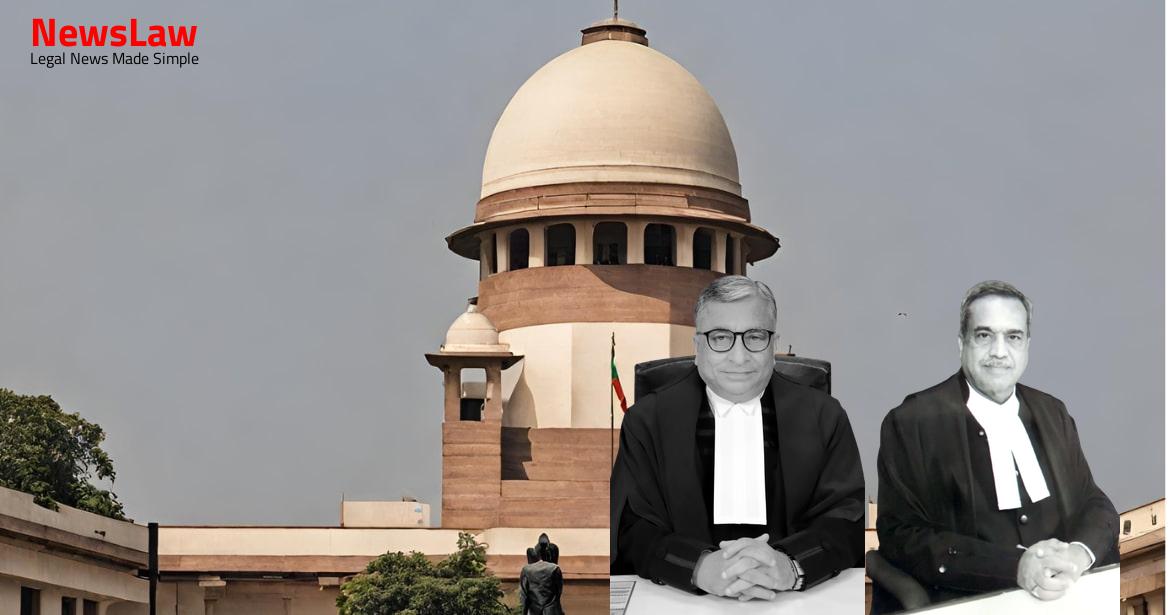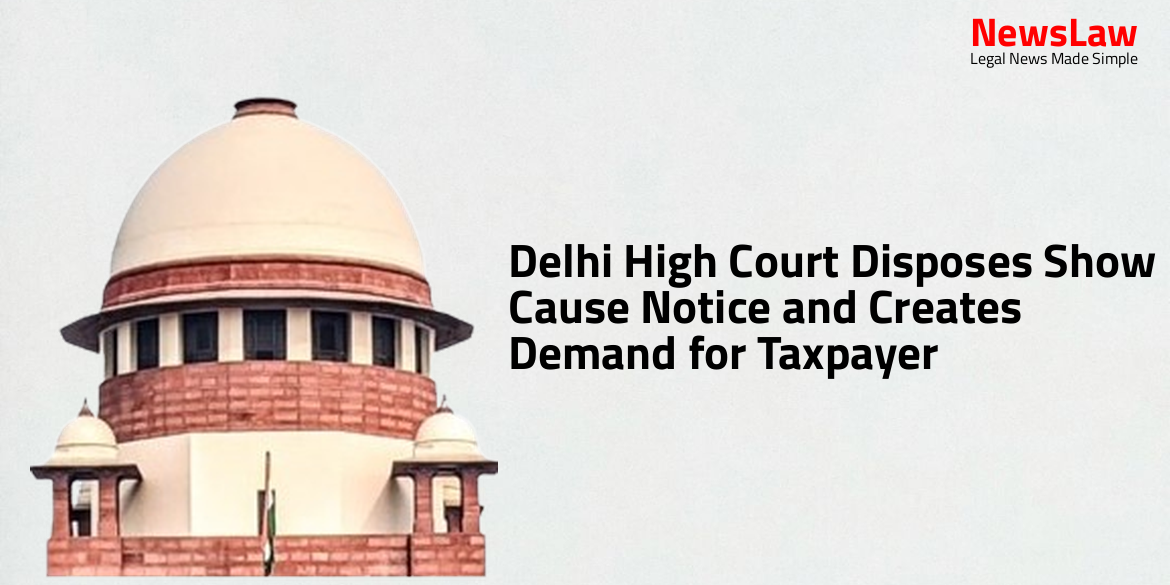Explore the intricate world of legal analysis within arbitral awards, where the court scrutinizes for defects and lack of reasoning. The importance of thorough examination and detailed explanations in legal judgments is paramount. Let’s dive into the complexities of legal reasoning and its implications on court judgments.
Facts
- Suit filed in O.S. No.1094 of 2012 in the High Court of Bombay was referred to arbitration under Section 8 of the Act.
- Sole Arbitrator, Mr. Justice R.G. Sindhakar (Retd.), passed an award directing ICICI Bank to pay the claimant Rs.50,00,00,000/- with interest and costs.
- ICICI Bank filed an application under Section 34(1) of the Act to set aside the award.
- Appellant sought directions to adjourn proceedings under Section 34(4) of the Act.
- Appellant was to develop various software applications for Smart Card based loyalty programs.
- ICICI Bank abruptly terminated the Service Provider Agreement causing losses to the appellant.
- Appellant suffered losses of over Rs.50 crores due to termination of the agreement.
- Appeal filed against the order of the High Court in Commercial Arbitration Petition No.190 of 2018.
- ICICI Bank challenged the award of the learned Sole Arbitrator directing payment to the appellant.
- ICICI Bank claimed there was accord and satisfaction between the parties.
- Appellant is a Private Limited Company providing card personalization services for Smart Card programs.
- Appellant had an agreement with ICICI Bank to manage Smart Card based loyalty programs for HPCL.
- The High Court passed a conditional order in response to the Notice of Motion taken out by the respondent.
- The Notice of Motion No.1549 of 2019, taken out by the appellant, was dismissed under Section 34(4) of the Act.
Issue
- The issue of whether the contract was illegally and abruptly terminated by the respondent needs to be determined.
Arguments
- The Petitioner/Appellant filed an application under Section 34(1) of the Act, arguing that the Arbitrator did not address Point No.1 but awarded Rs.50 crores to the Appellant.
- The Petitioner contended that the lack of a finding on the termination of the contract and the nature of the breach made the award erroneous.
- The High Court dismissed the application under Section 34(4) stating that the defect in the award was not curable.
- The Petitioner sought remission of the matter to the Arbitrator under Section 34(4) but was rejected.
- The Petitioner argued that the Arbitrator did not provide detailed reasons regarding the termination of the contract and the claim for compensation.
- The Respondent’s defense was based on ‘accord and satisfaction’ between the parties.
- The Petitioner cited previous judgments to support the argument that lack of reasoning in the award is a curable defect under Section 34(4) of the Act.
- The High Court found a jurisdictional error as the Arbitrator did not address Point No.1 before proceeding with the claims.
- The role of remission under Section 34(4) as a ‘curative alternative’ to setting aside the award was highlighted.
- Changing the award in resumption proceedings was deemed contrary to the Act, and the Arbitrator cannot assume the Court’s role in setting aside the award.
- Respondent’s counsel argued that there was no finding on the termination of the contract by the respondent, making remission under Section 34(4) not applicable.
- Appellant’s Notice of Motion was dismissed by the High Court with valid reasons.
- The respondent’s counsel contended that the appellant’s motion under Section 34(4) was belated and strategic to prolong the litigation.
Analysis
- The Court held that complete perversity in the reasoning is a ground to challenge the award under Section 34(1) of the Act.
- The respondent claims there was ‘accord and satisfaction’ between the parties, supported by evidence not considered by the Arbitrator.
- Section 34(4) of the Act gives discretion to the Court to remit the matter to the Arbitral Tribunal if appropriate.
- Court is not obligated to remit the matter to the Arbitrator just because an application is filed under Section 34(4) of the Act.
- The respondent argues that findings ignoring vital evidence on record are perverse and constitute patent illegality under Section 34(2A) of the Act.
- The appellant filed a Notice of Motion under Section 34(4) seeking remission, emphasizing the need for detailed reasons in addition to those already in the award.
- The power under Section 34(4) is to cure defects in the award by allowing the Tribunal to record additional reasons or fill gaps in reasoning.
- Application under Section 34(4) should be considered in conjunction with the grounds raised in the Section 34(1) application challenging the award.
- The Arbitrator’s failure to consider evidence leading to an erroneous decision can be grounds for setting aside the award.
- Under the guise of adding reasons, the Arbitrator cannot alter the essence of the award.
- Importance of documentary evidence like letters and emails in establishing ‘accord and satisfaction’ between the parties.
- Additional reasons by the Arbitrator in support of findings are deemed essential.
- Arbitrator’s inability to change his own award even on remittal.
- An award cannot be set aside solely based on an incorrect application of the law or reappreciation of evidence.
- An application for setting aside must be made within three months of receiving the arbitral award or the disposal of a request under section 33, with a 30-day grace period in certain circumstances.
- The Court, upon receiving an application for setting aside, may adjourn proceedings at the request of a party to allow the Arbitral Tribunal to address the grounds for setting aside.
- In this case, the appellant claims losses of over Rs.50 crores due to the respondent’s termination of the agreement, making a total claim of Rs.95 crores.
- Section 34(2A) allows for setting aside an arbitral award if it is vitiated by patent illegality, provided reasons for the award are stated.
- In the case of Som Datt Builders Limited v. State of Kerala, no reasons were given for the finding already recorded in the award, leading the Court to hold that the High Court should have given the Arbitral Tribunal an opportunity to provide reasons as per Section 34(4) of the Act.
- The AKN & Anr. v. ALC & Ors. case discussed the curative nature of remission as described in the legislative history of the Model Law, allowing the Tribunal to rectify deficiencies before enforcing the award.
- The Dyna Technologies Pvt. Ltd. v. Crompton Greaves Ltd. case highlighted the importance of inquiry under Section 34(4) of the Act, with the Court emphasizing the legislative intent behind this provision.
- In the Kinnari Mullick and Anr. v. Ghanshyam Das Damani case, the Court considered whether Section 34(4) of the Act empowers the Court to send parties back to the Arbitral Tribunal after setting aside the award, even without a specific application from the parties.
- In the judgement of Income Tax Officer, A Ward, Sitapur v. Murlidhar Bhagwan Das, it was highlighted that there is a distinction between ‘finding’ and ‘reasons’.
- ‘Finding’ refers to a decision made on an issue, as per the mentioned judgement.
- On the other hand, the judgement in J. Ashoka v. University of Agricultural Sciences and Ors. stated that ‘reasons’ act as the connective links between the materials that form the basis for certain conclusions and the actual conclusions themselves.
- Power conferred on the Court cannot be relegated to the Arbitrator under the guise of additional reasons or filling up reasoning gaps.
- Absence of findings on contentious issues cannot be cured by any amount of reasons provided in the award.
- A harmonious reading of Section 31, 34(1), 34(2A) and 34(4) of the Arbitration and Conciliation Act, 1996 clarifies that the Court can, in appropriate cases, allow the arbitrator to provide reasons or fill up gaps in reasoning upon a party’s request.
Decision
- Appeal found to have no merit
- No interference with the impugned order passed by the High Court
- Civil Appeal dismissed
- No order as to costs
Case Title: I PAY CLEARING SERVICES PRIVATE LIMITED Vs. ICICI BANK LIMITED (2022 INSC 7)
Case Number: C.A. No.-000007-000007 / 2022



